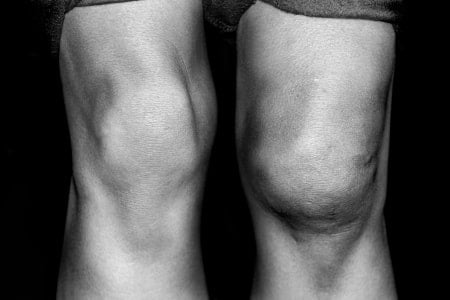
A swollen knee can be caused by an injury, overuse, or an underlying disease. When your knee swells, it is due to fluid building up in or around the knee. It is sometimes referred to as “water on the knee,” or a “knee joint effusion”. After a sports, work or twisting injury, the fluid in your knee might be bloody. Determining the cause of the swelling in the knee is critical. In this post we are going to explore the most common causes of swelling of the knee, and what your next actions should be.
A swollen knee is usually painful, though for some people, the most troublesome symptom is an inability to bend or straighten the knee. Knee swelling after an injury can be sign that your knee injury is serious. In general, knee swelling is a very common reason to see an Orthopedic Surgeon. Scroll down for our video on knee swelling.
Common Causes of a Swollen Knee:
- Osteoarthritis
- Other forms of arthritis (RA, Lupus, Psoriasis, etc)
- Lyme Disease
- Trauma or Injury ( ACL tears )
- Meniscus Tears
- Fractures
- Synovitis (inflammation of lining of our joints)
- Gout / CPPD
- Infections
Diagnosing a Swollen Knee
Your doctor may want to take a sample of the knee fluid to test for infection or disease. The result can help determine the cause of your swollen knee.
- Clear knee fluid: Clear fluid in a swollen knee is usually due to some form of inflammation. The most common reason is osteoarthritis.
- Cloudy knee fluid: if the fluid in your knee is cloudy, then the possible diagnoses include Gout, Lyme Disease, or an early infection.
- Bloody knee fluid: if the fluid taken out of your knee is bloody then you likely have a torn Meniscus, injured a ligament, or potentially have a small fracture in the knee. When a fracture is present, we will also see a little fat in the fluid.
- Pus: if the fluid in your knee looks like pus then you have a very serious infection.
Osteoarthritis – The Most Common Reason For A Swollen Knee
Osteoarthritis is by nature an inflammatory condition. As your arthritis worsens you may notice that the swelling is always present in the knee. Removing the fluid from an arthritic knee will usually make you feel better. Unfortunately for many arthritis sufferers, the swelling might return very rapidly.
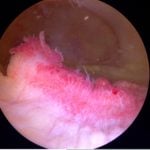
If your knee is swelling due to Osteoarthritis, it’s implied that your cartilage or the cushioning within the knee joint is wearing thin. The arthritic process also changes the chemicals within the knee and creates a rather hostile environment within the knee joint. This causes the Synovium to become irritated and produce a significant amount of fluid. Occasionally that fluid will migrate to the back of the knee and cause swelling in the back of the knee. If you have a swollen area in the back of the knee it is likely a Baker’s cyst.
Gout / CPPD
Gout is a relatively unusual cause of painful swelling within the knee. A swollen knee because of Gout is typically far more painful than the swelling associated with mild to moderate osteoarthritis.
CPPD or Pseudogout can also lead to swelling within the knee joint. The pain is not typically as severe as it is with gout or severe Osteoarthritis. Occasionally we will see evidence of Pseudogout on x-rays for someone who presents to our office with complaints of swelling and discomfort and stiffness in the knee.
Lyme Disease
As an Orthopedic Surgeon in Westchester County, NY I am deep in the heart of Lyme Disease country. Lyme disease is another very common reason why your knee might be swelling. When your knee swells and you do not recall an obvious injury, especially in my area of New York (and many cities on East Coast), Lyme Disease is very high on the list of possibilities.
Lyme Disease can be quite difficult to identify and manage. Many people test positive for it but do not have the disease. Yet, if you have a swollen knee, no recent injury and live in an endemic region you should be evaluated very soon after the swelling begins. The earlier you initiate treatment the easier it is to cure.
In order to diagnose Lyme Disease we will usually order a blood test and take a sample of fluid from your knee for further testing. Lyme disease can be diagnosed year-round. Especially with a mild winter.
Infection
Your knee joint may swell if the knee joint is infected. This can occur by an infection from other parts of the body spreading, by a wound, surgeries, or many other possibilities.
Trauma or Sports Injury
Trauma is a common cause of swelling in the knee. In these instances the fluid in the knee might be blood from a meniscus tear or an ACL tear. If you have a very swollen knee after a traumatic injury you should see an Orthopedic Surgeon to determine what type of injury you might have sustained. X-rays are important to be sure there isn’t a fracture around the knee. Most injuries that result in significant swelling due to bleeding have a meniscus tear, fracture, or ligament tear such as an ACL tear.The swelling from an acute injury will diminish over time as the blood is reabsorbed. Cartilage injuries are less common, but still on the list of possibilities.
Other Causes of Knee Swelling
There are many other possible causes of knee swelling, though not all are as common. A knee cap dislocation or other injuries, or rare infections or diseases can cause a swollen knee as well.
Treatment of a Swollen Knee:
If the knee is swollen because of trauma, injury or sports, then consider seeing an Orthopedic Surgeon soon for evaluation.
If this is your first swollen knee episode and you are not known to have a history of osteoarthritis it is very important to have your knee evaluated by your primary care doctor or an orthopedist. This is especially true if you live in regions of the country where tick borne illnesses are common. Lyme disease is far easier to treat if caught early.
If your knee is swollen, and exceptionally painful it is important to be evaluated on an urgent or emergent basis to be sure you are not suffering from an infection. Typically the swelling associated with gout or infections is far more severe pain than the swelling associated with the other causes of inflammation. If you have a hot, swollen and exceptionally painful knee you will require testing of the fluid from within your knee to rule out either gout or an infection.
If you have a known history of osteoarthritis, or if your swelling follow the particularly hard workout or run in the knee feels more stiff than painful then a course of moist heat, over-the-counter medications, and a compression sleeve will often result in resolution of the swelling. The swelling associated with mild arthritis or activity should resolve within 1-3 days. If the swelling persists is likely worth your time to be evaluated for other causes of swelling. Continuing to wear a compression sleeve during activities might keep the swelling from recurring often.
Take Home Message:
The most important thing we need to do when dealing with a swollen knee is to determine why the swelling is present.
If you have a very warm, swollen, and exceptionally painful knee see your doctor or consider going to the emergency room.
If you have swelling that is not related to trauma and you have no known history of arthritis then you should strongly consider seeing a physician to be tested for Lyme disease if you live in an endemic area.
If you have a known history of osteoarthritis then you should expect episodes of swelling on occasion. Over-the-counter medications, he and a compression sleeve will generally help control the swelling.
Some activity modification might also be necessary.
If you have swelling following an injury this is likely due to bleeding within the knee joint. That bleeding will subside over time. Rest, compression, and elevation will help minimize the swelling related to trauma.
You should also consider seeing a physician to determine the nature of the injury.


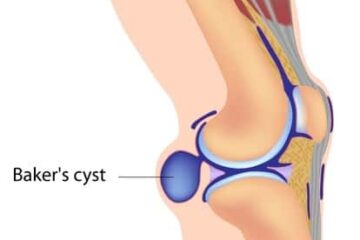
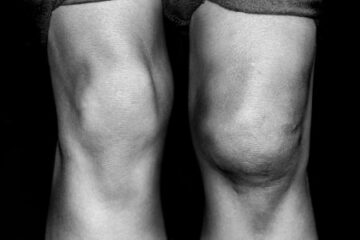
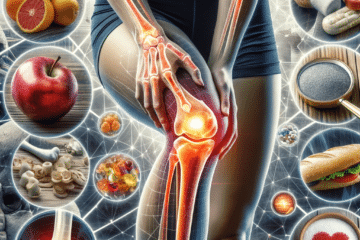
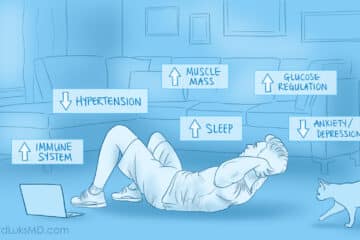








Thank for the info it was the best of my research online liked the picture of the knee looks like mine have both knees with I belive what ultra compartment half because of bone on bone have the swollen left two times use ice and takes 3 days to get back on my feet should I also use ice and heat
Thanks William. Most people like either ice or heat. There’s little harm in trying both. Consider using compression sleeves too.
Good Luck
Thank you for the great information. Now I have some idea of what maybe my problem. Both my knees are extremely sore and swollen, warm to the touch. I have been diagnosed with osteoarthritis. The one subject you brought up that concerns me is the possibility of it being caused by Gout. I have not ever been diagnosed with Gout, however, my Father suffered from it for many years before passing away in 2009. His Gout was always in his big toe. So I’m wondering if such a condition could be hereditary. I was diagnosed many years ago with Lymphedema and have worn compression stocking since. Could this be that worsening? I will contact my Family doctor Tuesday morning unless this pain and stiffness becomes worse. Again, thank you for writing such an informative article.
Thanks Abigail… I’m glad that you found it useful.
Doesn’t sound like gout… but lets see what your doctors evaluation finds out.
I have knee problems now for 8 months, I have very bad osteoarthritis ! I have to get an MRI in 2 weeks because it happens so often! I was referred to a orthopedic surgeon in March but haven’t heard a word so being that my Dr is a specialist he figured he would order one to see what’s going on but its so painful and swells on the back as well! I found that your information was really helpful ! Thanks
Howard J. Luks, MD,
I have had a swollen knee for close to three years now – yet no success in curing the problem. I have been tested for numerous causes all mentioned in the information above.
I have had key hole surgery which showed that my synovium is inflamed. They also took a lining of my knee for testing which also came back negative.
I have had my knee drained three times (about 80mls of fluid) and also injected with a steroid each time, which erases the swelling for a couple of weeks but then it comes back again. Also been on three courses (a month each time) of steroid tablets, but however the process repeats. Once I come to near finishing the course the swelling comes back.
I am getting very disheartened now as I have lost a considerable amount of muscle on my leg due to the swelling and not being able to use my muscles in their full affect.
What would you suggest?
I would see another rheumatologist … sometimes it takes a new set of eyeballs on the situation to arrive at the right diagnosis.
Thanks for the advice, I will get into that
Hello James,
Have you had any resolution yet to your knee issues. I am feeling I could have the same issue, going on 7 months with some concerning muscle loss. Swelling/pain has not decreased and continue with physical therapy. Not sure if I continue with more aggressive daily routine of physical therapy and ice if it will help at all. And thinking it could be something else that may need treated with antibiotics.
Howard J. Luks, MD,
Hope to get your advise on my knee issues.
I have discomfort in the knee due to fluid build up. MRI states “muscle fibers edema along the medial head of gastrocenimus muscle. What do you think might be the underlying cause of the sprain, muscle imbalance or wrong shoe..?
I honestly do not know… fluid in the knee without any trauma or signs of arthritis is usually evaluated by a rheumatologist if the swelling persists for a few weeks. In some areas of the country we also check for Lyme disease and other tick borne issues.
Talk to your primary care doctor.